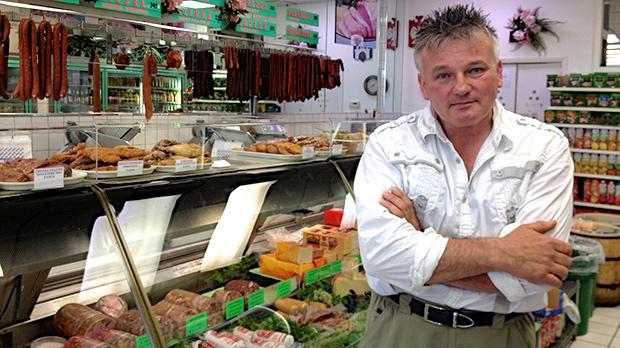Chicago’s Polish Village Hopes Immigration Reform Will Spark a Revival
Peter Baciks father once owned a deli in Chicagos Polish Village. But he said that when he and his wife chose a location for their own deli, they went to the suburbs instead as the polish population in the Village thinned out. (Photo: Odette Yousef)
It’s not clear whether Congress will pass immigration reform this year. But in Chicago, one community thinks it may be their last shot to save their neighborhood’s ethnic identity: that is, Polish-Americans. Chicago has one of the largest Polish populations outside Warsaw. For decades their patch on Chicago’s northwest side was thriving, but now it’s fading. Thanks to immigration reform, lawmakers are talking about making it easier for some tourists to travel to the US, including Polish tourists. From member station WBEZ, Odette Yousef reports on why that could make a difference.
You might wonder what tourism has to do with immigration reform. Well, the Senate’s proposed bill ties them together. It would expand something called the US Visa Waiver Program, a program that fast-tracks tourists from certain countries, allowing them to enter the US without visas.
Right now, Poland’s not included in the Visa Waiver Program, which causes all kinds of hassles for would-be visitors.
“You have to sink over $100 just to have the chance to maybe come,” explained Dan Pogorzelski, executive eirector of the Greater Avondale Chamber of Commerce. Pogorzelski is referring to a non-refundable $160 fee to fill out a visa application. His organization serves as a booster for businesses in the northwest Chicago neighborhood that includes Jackowo, or Polish Village.
“You have an interview process and people have said numerous times that they can ask very invasive, very degrading questions when they’re waiting,” Pogorzelski expanded. Pogorzelski, a proud Polish American, says immigration reform would let Polish tourists visit the US and historic Polish enclaves like Polish Village without the visa hassle. He says that could bring sorely needed tourist dollars into the neighborhood.
“Many of these stores have been closing,” said Pogorzelski, “and this is certainly one way that these establishments certainly hope that they can revitalize their business.”
Many business owners are quick to voice their hope for this change when they’re asked to say how business has been. Danna Pluta, owner of a nightclub called the Podlasie Club, said business has steadily declined over the last thirty years.
“Three-quarters less people than there were before,” said Pluta through Pogorzelksi’s translation. Pluta’s comparing this to the 1980s, when she opened her bar. At that time, nightclubs like this were hot on Friday and Saturday nights. But today, the busiest time is Sundays, when people come back to Polish Village for services at the historic St. Basilica Catholic Church, a Polish church visited by Pope John Paul II.
So what’s happened? Well, immigration from Poland peaked in the 1980s, then many of those Poles moved out of Polish Village, to the suburbs. Then in 2004, Poland joined the European Union, opening all of Europe to Polish workers. That meant they didn’t need to come to the US for jobs anymore. And when the US economy tanked in 2008, many Poles headed back home for work.
So there are fewer Poles in Chicago now. But Pluta hopes a new Visa Waiver Program can bring them back—as tourists. Before we left her club, she pleaded with Pogorzelski to help save the neighborhood’s Polish identity.
“This is so beautiful,” she said, “we need to make sure we save this area.”
If Pluta gets her wish, it’ll benefit far more than Poles. A broader Visa Waiver Program could make US travel easier for tourists from nearly a dozen countries, including Brazil, Argentina, and Israel.
But the House of Representatives might not even take up immigration reform this year. That’s why Peter Bacik isn’t betting on changes to visa laws that could help Polish Village.
“Really, to be honest, you have to be very realistic and honest with yourself,” said Bacik. “You’re hoping more than anything else.”
Bacik’s father once owned a deli in Polish Village, but it closed when Poles started leaving. Bacik said that taught him an important lesson.
“Nothing lasts forever.”
Bacik said that instead of hoping for immigration reform, businesses in Chicago’s Polish Village should focus more on finding new customers. That’s what he and his wife did when they opened their own deli about 20 years ago, 10 miles north of Polish Village, in the suburbs.
Our coverage reaches millions each week, but only a small fraction of listeners contribute to sustain our program. We still need 224 more people to donate $100 or $10/monthly to unlock our $67,000 match. Will you help us get there today?
